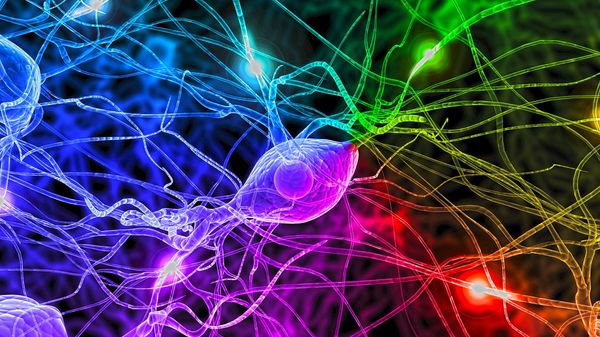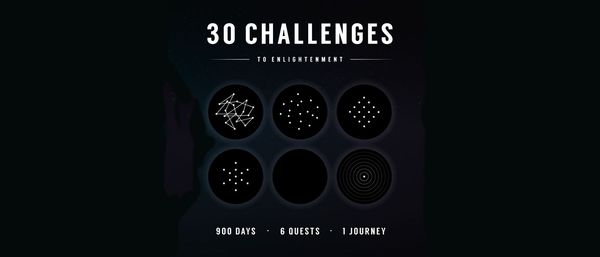Jordan Lejuwaan • • 4 min read
7 Ways to Overhaul Your Brain!

While most exercise is focused on strengthening and improving your physical body and muscles, there is very little focus on keeping your brain sharp and healthy. This is interesting because the brain is obviously the most important organ in your body, not only controlling the muscles people spend hours working to build up, but also your memory, thought process, attitude, etc. Don’t get me wrong, abs are great, but the brain needs to be supplemented too. It is far more important to your overall well-being. Here are the best exercises/activities that you can do to keep your brain in tip-top condition:1. Challenge Your Brain
The majority of people are stuck in ruts. They go to the same job everyday, hang out with the same friends and eat at the same places. While that may feel safe, it’s not the most stimulating lifestyle for your brain. Those synapses have been built up enough, so try something that you do NOT know how to do! Buy a model car kit, master the art of sudoku or crosswords, or go pick up another major at your nearest college. The point is you need to be learning new things to keep your brain honest. Form new synapses by forcing your mind to work in ways it has not worked before. Just like physical workouts, doing too much of the same exercise will eventually give no results. Switch it up!2. Brain-FoodEat:– Sources of Omega-3 fatty acids, mainly fatty fish and grass-fed animals. Omega-3’s are instrumental in making your brain membranes fluid, allowing signals to be passed back and forth. Obviously communication is pretty important in the brain, so keep those signals flowing!– Enough food everyday! Your brain needs energy too, not just your muscles. Do Not Eat: – Too much cholesterol, high amounts are linked to brain diseases like Alzheimers.– Too much fat, sugar, etc. All of that bad stuff is linked to brain health in addition to overall bodily health! System-wide diseases like hypertension, Type-II Diabetes and obesity have been linked to loss in cognitive ability and memory loss. If it’s not good for your physique, it’s probably not good for your brain either.3. Sleep WellR.E.M. sleep is critical for the for being able to retain information and maintaining learning ability. Sleep is the time when your brain resets, builds new synapses and brain cells and rids itself of the by-products of normal use. Sleep deprivation leaves you feeling not only tired, but less able to perform simple to advanced cognitive functions. So make sure you are getting that healthy minimum of 6, if not 8 hours of sleep per night. If that’s impossible, take a short nap during the day. Naps can do a lot more than you think, so use the info below to decide how long of a nap you need: 2-5 Minute – Reduces sleepiness5-20 Minute – Increases alertness, stamina and cognitive performace.20-30 Minute – Perks of the 2-20 minute nap, plus helps with muscle memory and clears the brain of information build-up, hence improving memory ability. 50-90 Minute – This get’s into the REM sleep cycle, so it helps with memory consolidation and virtually everything else. REM sleep is the one cycle that we as humans need to live without going. Alternate sleep cycles adjust the body to going directly into REM sleep, skipping out on the other non-important cycles. This nap will leave you a little groggy but will reset everything and restore complete cognitive power unless you have a massive REM sleep debt built up already.
4.Remember Stuff!When it comes to memory, the use it or lose it rule applies. And considering your cognitive ability is relatively useless if you cannnot remember what you learned yesterday, you should probably start using it. Try pulling out an old photo album and recollecting entire days or events related to the photos you see. Really try to recall even the most insignificant of details; this should be a workout for your brain. Even try to remember a full conversation that you had yesterday, anything that get’s your memory going. If you’re having a lot of trouble with even those exercises, start a journal to get yourself to remember at the end of each day. That will build you up immediately so that you can start remembering less recent events.5. Relax RegularlyWith constant activity, overthinking and stress, your brain can get very over-loaded with a bunch of thought that just does not need to be there. More importantly, stress increases the chances of dimentia and Alzhiemers. Stress relseases the fight-or-flight hormones into your brain, reducintg your ability to think clearly. So throw out the insticts and relax instead: Take 15-30 minutes during the day and just sit in silence. Eyes open or closed, breath deeply for a little bit and try to empty your mind. Think about nothing. Then meditate, pray, do yoga, or just sit there. Whatever suits you. Just get that relaxation break in during the day so you can clear your mind. 6. ConcentrationThe ability to concentrate is obviously huge in terms of cognitive ability. You will dramatically increase your ability to think clearly and efficiently if you are able to concentrate better. So:1. Practice! While you are relaxing, concentrate on something. One thing that you want or a problem that needs to be solved. Keep your mind on that topic for the length of your relaxation period. This is much more difficult than it sounds so just keep doing it. If you space out, shake your head and go back to concentrating!2. Realize when you are distracted and what is causing it. If it is something that is weighing on you, address it right there and then! If you keep getting distracted, you will just be inefficient at whatever you are consciously trying to accomplish.
7. Alcohol is a poison, you know…Don’t go overboard. Alcohol is just bad for the brain in large amounts. Check out this page which lists a seemingly infinite amount of brain functions that alcohol abuse impairs. Memory gets hit pretty hard in addition to overall cognitive ability. If you feel the need to intoxicated, try other safer drugs (like marijuana) instead of the “devil’s juice”.
The majority of people are stuck in ruts. They go to the same job everyday, hang out with the same friends and eat at the same places. While that may feel safe, it’s not the most stimulating lifestyle for your brain. Those synapses have been built up enough, so try something that you do NOT know how to do! Buy a model car kit, master the art of sudoku or crosswords, or go pick up another major at your nearest college. The point is you need to be learning new things to keep your brain honest. Form new synapses by forcing your mind to work in ways it has not worked before. Just like physical workouts, doing too much of the same exercise will eventually give no results. Switch it up!2. Brain-FoodEat:– Sources of Omega-3 fatty acids, mainly fatty fish and grass-fed animals. Omega-3’s are instrumental in making your brain membranes fluid, allowing signals to be passed back and forth. Obviously communication is pretty important in the brain, so keep those signals flowing!– Enough food everyday! Your brain needs energy too, not just your muscles. Do Not Eat: – Too much cholesterol, high amounts are linked to brain diseases like Alzheimers.– Too much fat, sugar, etc. All of that bad stuff is linked to brain health in addition to overall bodily health! System-wide diseases like hypertension, Type-II Diabetes and obesity have been linked to loss in cognitive ability and memory loss. If it’s not good for your physique, it’s probably not good for your brain either.3. Sleep WellR.E.M. sleep is critical for the for being able to retain information and maintaining learning ability. Sleep is the time when your brain resets, builds new synapses and brain cells and rids itself of the by-products of normal use. Sleep deprivation leaves you feeling not only tired, but less able to perform simple to advanced cognitive functions. So make sure you are getting that healthy minimum of 6, if not 8 hours of sleep per night. If that’s impossible, take a short nap during the day. Naps can do a lot more than you think, so use the info below to decide how long of a nap you need: 2-5 Minute – Reduces sleepiness5-20 Minute – Increases alertness, stamina and cognitive performace.20-30 Minute – Perks of the 2-20 minute nap, plus helps with muscle memory and clears the brain of information build-up, hence improving memory ability. 50-90 Minute – This get’s into the REM sleep cycle, so it helps with memory consolidation and virtually everything else. REM sleep is the one cycle that we as humans need to live without going. Alternate sleep cycles adjust the body to going directly into REM sleep, skipping out on the other non-important cycles. This nap will leave you a little groggy but will reset everything and restore complete cognitive power unless you have a massive REM sleep debt built up already.
4.Remember Stuff!When it comes to memory, the use it or lose it rule applies. And considering your cognitive ability is relatively useless if you cannnot remember what you learned yesterday, you should probably start using it. Try pulling out an old photo album and recollecting entire days or events related to the photos you see. Really try to recall even the most insignificant of details; this should be a workout for your brain. Even try to remember a full conversation that you had yesterday, anything that get’s your memory going. If you’re having a lot of trouble with even those exercises, start a journal to get yourself to remember at the end of each day. That will build you up immediately so that you can start remembering less recent events.5. Relax RegularlyWith constant activity, overthinking and stress, your brain can get very over-loaded with a bunch of thought that just does not need to be there. More importantly, stress increases the chances of dimentia and Alzhiemers. Stress relseases the fight-or-flight hormones into your brain, reducintg your ability to think clearly. So throw out the insticts and relax instead: Take 15-30 minutes during the day and just sit in silence. Eyes open or closed, breath deeply for a little bit and try to empty your mind. Think about nothing. Then meditate, pray, do yoga, or just sit there. Whatever suits you. Just get that relaxation break in during the day so you can clear your mind. 6. ConcentrationThe ability to concentrate is obviously huge in terms of cognitive ability. You will dramatically increase your ability to think clearly and efficiently if you are able to concentrate better. So:1. Practice! While you are relaxing, concentrate on something. One thing that you want or a problem that needs to be solved. Keep your mind on that topic for the length of your relaxation period. This is much more difficult than it sounds so just keep doing it. If you space out, shake your head and go back to concentrating!2. Realize when you are distracted and what is causing it. If it is something that is weighing on you, address it right there and then! If you keep getting distracted, you will just be inefficient at whatever you are consciously trying to accomplish.
7. Alcohol is a poison, you know…Don’t go overboard. Alcohol is just bad for the brain in large amounts. Check out this page which lists a seemingly infinite amount of brain functions that alcohol abuse impairs. Memory gets hit pretty hard in addition to overall cognitive ability. If you feel the need to intoxicated, try other safer drugs (like marijuana) instead of the “devil’s juice”.










